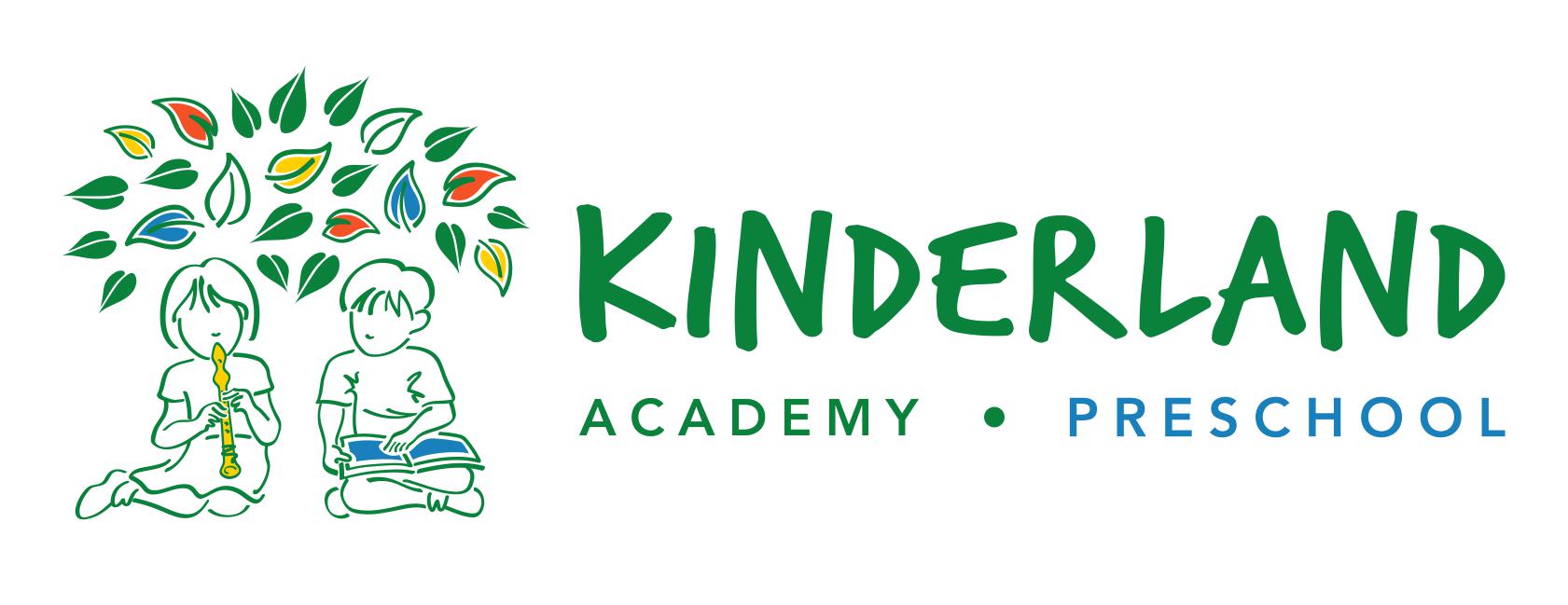Learning in harmony: How early exposure to music sets children up for academic success
Kinderland’s music-infused curriculum weaves the joy of musical exploration into learning, nurturing critical skills like problem-solving, creativity and emotional awareness.
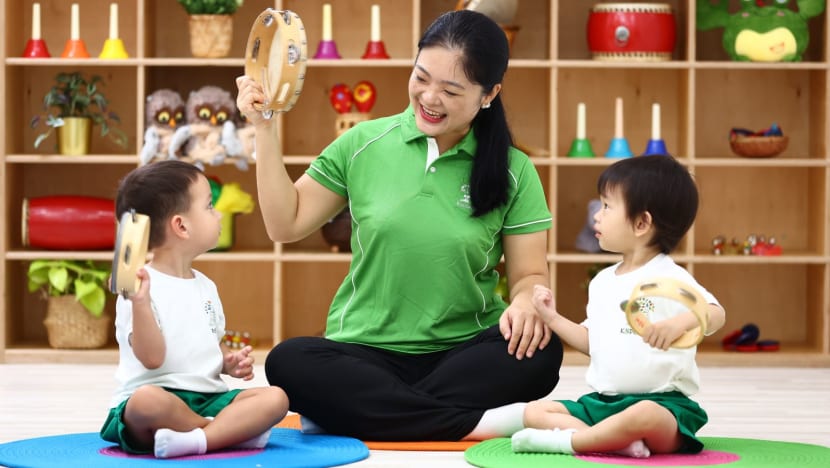
Music promotes cognitive development and overall well-being in children, particularly during the critical first five years of life. Photos: Kinderland

This audio is generated by an AI tool.
When five-year-old Janelle Tan came home singing a song about the water cycle, her mother, Ms Yeo Pei Qin, was amazed. “She could explain concepts like evaporation and condensation,” Ms Yeo said. “She learned all that new vocabulary in a fun and engaging way through music.”
Janelle and her three-year-old sister both attend Kinderland Preschool @ Marine Parade, where their older sister graduated in 2023. Backed by four decades of experience in early childhood education across Singapore and Asia, Kinderland offers a distinctive music-infused curriculum designed to give children an advantage in the early years of their life.
The early years of a child’s life are a crucial period of growth and development. During this time, young minds are soaking up new experiences that form the building blocks for their cognitive abilities, social skills and emotional resilience.
Music has long been proven to be a powerful tool in early education. Studies show that music goes beyond entertainment; it supports the development of critical skills such as problem-solving, creativity and emotional awareness.
A MELODY FOR THE MIND
Even the youngest children light up when they experience music – whether it’s singing a tune, clapping to a beat or tapping away on a toy keyboard.
Research shows that music activates key areas of the brain tied to language, hearing and motor control, all of which play a role in literacy and cognitive development.
Singing, for example, engages the brain in processing the melody, lyrics, rhythm, expressions and gestures simultaneously – a multitasking feat that stimulates both hemispheres and builds neural networks essential for academic tasks. A 2009 study led by Dr Ellen Winner, a psychology professor at Boston College, and Dr Gottfried Schlaug, a neurology professor at Beth Israel Deaconess Medical Center and Harvard Medical School, adds weight to this. Children who received 15 months of weekly music instruction and practice showed enhanced brain networks associated with sound discrimination and motor tasks.

In addition, a study conducted by the University of Wisconsin and the University of California, published in the 1990s, found that learning the piano can improve mathematical ability. Second-grade students (equivalent to Primary 2 in Singapore) who underwent four months of piano keyboard training scored 166 per cent higher on proportional mathematics tests than those without training.
What all of this means is that regular participation in structured musical activities helps to enhance brain development, particularly in young children. With 90 per cent of brain development occurring before the age of five, this is a critical window for fostering learning and cognitive growth.
HARMONISING GROWTH AND LEARNING
To make the most of music’s transformative impact on young minds, Kinderland’s signature Children’s Music Programme (CMP) has placed music at the heart of its curriculum since its inception in 1978. The curriculum is continually being enhanced so that students are well-equipped for the challenges of the modern world and formal schooling after they graduate.
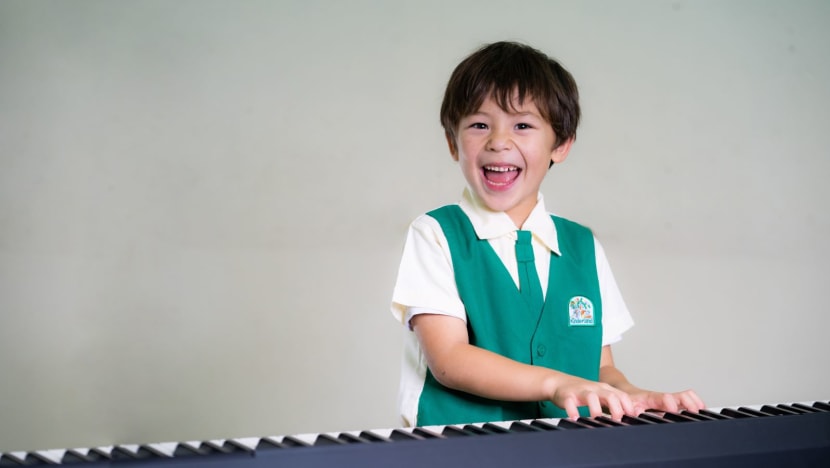
Taught by professionally qualified music specialists, the curriculum features different forms of music. Children as young as two months old begin their musical education with exposure to percussion sounds, songs and rhymes, laying the foundation for musical appreciation.
From ages three to four, children are further encouraged to express themselves musically by learning basic keyboard and percussion skills, which fosters focus, discipline and coordination in a hands-on way.
For children aged five to six, music education becomes more structured with weekly keyboard lessons. Through these sessions, they sharpen their listening, singing, keyboard playing and notation reading skills.
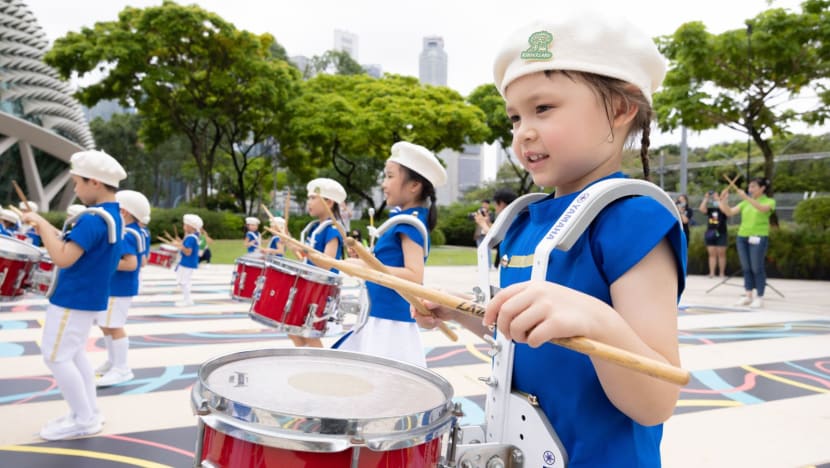
Kinderland also provides children with opportunities to perform before live audiences through pianica ensembles, stage ensembles and even marching band showcases.
“I have seen my children grow in confidence thanks to the exposure they get from public performances and playing music at school,” said Ms Yeo.
SETTING THE STAGE FOR EXCELLENCE
Apart from its signature curriculum, Kinderland weaves music into other key programmes as well. This includes KinderFit, a structured cardio-wellness initiative that promotes motor skills and self-confidence alongside leading a healthy lifestyle, and S.T.R.E.A.M, a programme that focuses on science, technology, reading and writing, engineering, art and mathematics.
“Studies show that incorporating music into a preschool’s curriculum enhances children’s concentration and memory, encourages attentive listening and improves the ability to express feelings,” said Dr Carol Loy, senior director, curriculum and professional development at Kinderland. “Additionally, music evokes emotions and creates a heightened level of awareness and mental acuity.”
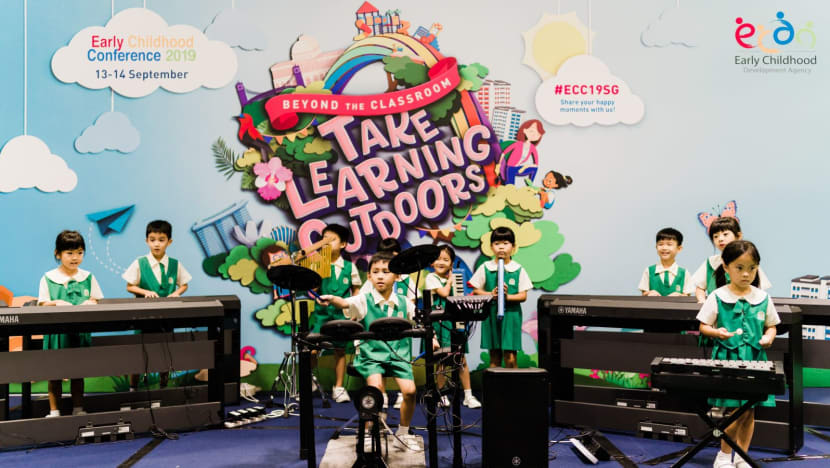
For Ms Khaw Chun Ting, a Kinderland alumna, music has made a lasting impact on her two sons, Evan, four, and Finn, two, who now attend her former preschool.
“The school environment and curriculum strike a great balance between learning and fun,” she said. “My children love the music exposure and often engage in song and dance at home.”
Start your child’s learning journey on the right note with Kinderland’s holistic learning approach. Take a Kinderland tour or connect with a Kinderland centre leader to find out more.








